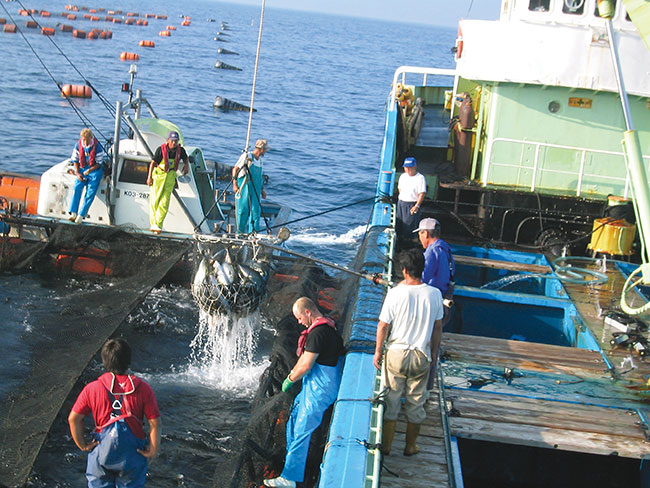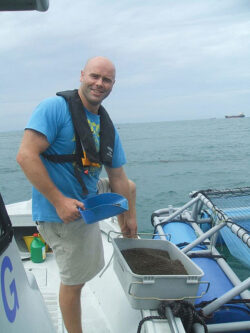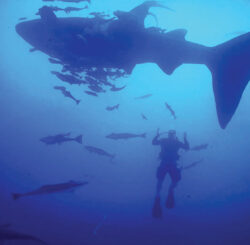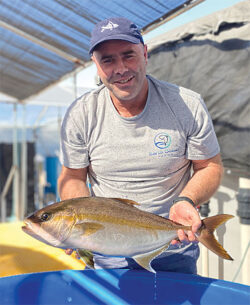
The mobile aquaculturist
March 4, 2024
By
Seyitan Moritiwon
Erik Vis shares his story of adventure in aquaculture By Seyitan Moritiwon
 In Japan, where the seriola q. get harvested and brought live to the processing plant
(Photo: Erik Vis)
In Japan, where the seriola q. get harvested and brought live to the processing plant
(Photo: Erik Vis) Vis means “fish” in Dutch. Erik Vis took that as a sign that he was born for a life in aquaculture.
The Dutchman studied aquaculture at Wageningen University from 1996 to 2002, in the Netherlands. After an internship at Nutreco in 2002 (Marine Harvest now known as Mowi), he was able to travel around operating fish farms.
After spending five years at Marine Harvest Japan, he moved to Singapore in 2008, where he was production manager at Barramundi Asia Pte Ltd., which he helped found. After about seven years, he moved to Panama in 2015 where he worked as a marine farm manager and director of farming operations at Open Blue Sea Farms Inc. In Hawaii, he worked at Blue Ocean Mariculture for about seven months in 2020, before moving to work with the National Aquaculture Group in Saudi Arabia in August 2020.
His more than 20 years in fish farming have led him to nomadic adventures around the world.
“I didn’t realize that I would go all over the world. That is so cool about our job at the moment. There’s so many options all over the world we can work. And it’s been a very big adventure ever since,” Vis said.
Most recently, he has settled in Nova Scotia, Canada, where he takes on a new role as Innovasea’s Aquaculture Services lead. In his new role (since last July), he harnesses his wealth of experience to provide support and planning strategies to help other aquaculture businesses.
From being an intern in Japan and now to Canada, we explore this mobile aquaculturist’s journey.
Aquaculture North America: Tell me the story of how you got into aquaculture.
Erik Vis: I just finished university (in 2002).
I was like, 24, 25. I did two years in Belgium, veterinary surgery. And then I went to Wageningen. And then I went to Japan for three months. I remember very clearly, the guy that was working in Skretting, Nutreco at the time. He said, “Come over for three months.” And I had the backpack for three months. That’s it.
And then after three months, I said “And now?” He said okay, let’s sign a contract. And then I stayed there for five years. So that was really nice because everybody says, “Please come, but we need experience” and nobody has experience when you’re just from school. So this person hired me and that gave me the chance to get real experience in Japan.

Erik Vis feeding fish at Singapore startup, Barramundi Asia. (Photo: Erik Vis)
And Japan is like heaven for fish farmers. There’s fish farming everywhere. I was learning, feeding the fish, diving for dead fish, learning Japanese, all the things that a fish farmer does and that’s where I also learned that yes, we come from university but we don’t really know much. That’s why I am a very hands-on manager.
Advertisement
The Japanese are very hardworking. I started as a site manager, and then I grew into the country production manager at Marine Harvest Japan. I sort of forgot my Japanese. But I think that if I would go back to Japan, it would come back.
Then my old boss from Japan, who was already in Singapore said “Come, Erik, let’s start a new company together.” And then we started Barramundi Asia Pte Ltd. in Singapore, and that’s where I stayed seven years. It was an achievement, a very fulfilling achievement. From Singapore, we went to Panama, Hawaii, Saudi Arabia, and then Canada.
In Panama, the farm was on the Atlantic side and I was living on the Pacific side. In the morning, I would see the Pacific Ocean. I would drive to the Atlantic Ocean. We were farming in five-meter waves. I’m not exaggerating, there were five to six-meter waves. And we were harvesting, no problem. In Saudi Arabia, I was based two hours from Jeddah. The Red Sea was next to us so the fish we had was in the Red Sea. The barramundi and the best-tasting fish ever. The salt is a little bit higher but it was very good tasting fish.
ANA: What was the biggest culture shock you experienced in different countries?
Vis: In Japan, it’s just completely different. In a meeting, you cannot be very direct, like Dutch persons are. So, you have to sort of talk about the weather, talk about everything but work and then, slowly, you build it up. You need to be patient, you need to build a relationship. But when you prove yourself, they sort of let you in. The food and the cuisine are amazing. And people were always polite and nice, like Canada.

Erik Vis diving with whales harks in Panama.(Photo: Erik Vis)
The people in Panama were very nice and very warm.
Then you go to Singapore, which is more Chinese that are a bit rough, more business.
I came from Japan, where everywhere you have aquaculture, to Singapore where there were like 100 farmers, but they were all relatively small farmers. And we were trying to become a big farm with big pens, but there was a different kind of approach to it so you needed to do everything yourself.
I hired a guy from Japan, he was teaching my guys how to sew nets. Amazing guy. And then on top of that, I played rugby for the national team in Singapore. And then in Hawaii, Covid hit. Couldn’t do anything, couldn’t go outside. It was only six months, was a bit short.
In Saudi, there’s a very big emphasis on religion. I was living in a desert, literally. So I could walk out of my apartment and I was in the desert. It’s a male society, you don’t meet any women. You don’t have any female colleagues. That’s slowly changing.
I’m very new here (Canada). The job I’m doing now is very different. So now I’m visiting farms and potential customers to talk about fish farming, which of course is completely different than farming fish on the spot every day. So it’s like a big career shift for me. I don’t think I can compare other countries. I mean, Halifax is amazing. Nice. Apart from the weather. Nice people, everything is nice. I’m not farming fish, so it’s a different thing.
ANA: What are the job opportunities in other places? How difficult is it to get a new job in a different country?
Vis: You get approached by headhunters. It’s a very small world. The new platform to use is LinkedIn if you’re open to moving, you have to go on LinkedIn. It’s very old-fashioned to think that you’ll be found if you are not on LinkedIn. It’s the same as Instagram and everything, you need a few good keywords and things that you want to be focused on and then people can find you.
With our background now, I think you can work all over the world. It’s a chance and an adventure to do with your family, if that is possible. Of course, it’s very difficult to run a fish farm in a different country with different cultures, different languages, and different issues, but it’s an experience that you will learn from. So for my fellow farmers, open up. Open up to the world.
ANA: What future do you hope to see for aquaculture globally?
Vis: A lot of different warm water species we are developing and we’re focusing on genetics and our biggest issue with the warm water species is the FCR (feed conversion ratio). Salmon now has an FCR of 1.1 to 1. Very good. Although, warm water species are not there yet. But we’re catching up.

Erik Vis at Blue Ocean Mariculture with seriola r. broodstock. (Photo: Erik Vis)
Part of the catching up is better husbandry, better genetics, better feed, and less protein in the feed. So you’re also working on the fish-in, fish-out ratio. So all these things are developing, and I think the next 10 years, that’s going to be the big thing, that you are trying to be carbon neutral, and trying to be thinking about the environment. On top of that, we have a lot of help with AI, or in my company, we’re using a lot of AI to recognize fish behaviour and see if you need to feed more or less.
There’s not enough young people getting into it (aquaculture) and I think, although I may be romanticizing it a little bit, this is a cool job. I did a sort of R&D education, if I knew that it was going to be this exciting, I’d have also added business management in there for myself. And I think people underestimate that. We need more people who are educated and want to pull up their sleeves and then later grow into management.
- Vietnamese imports likely not a challenge, but import market bears watching, says NAA director
- Research shows positive impacts of mussel and seaweed farms





